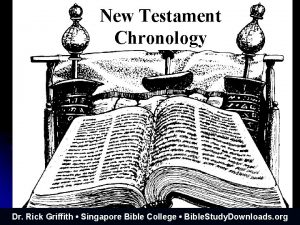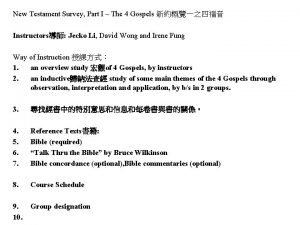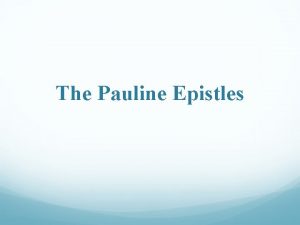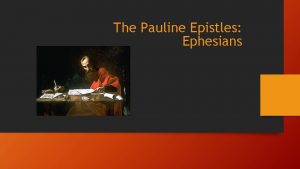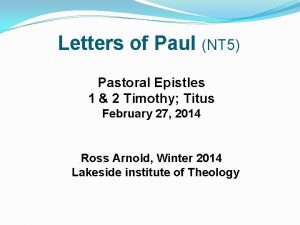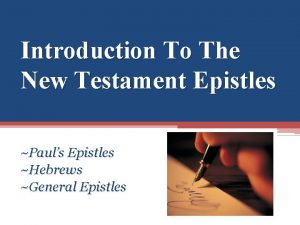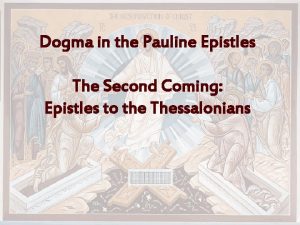Letters of Paul NT 5 Pauline Epistles The









- Slides: 9

Letters of Paul (NT 5) Pauline Epistles The Significance of Paul March 6, 2014 Ross Arnold, Winter 2014 Lakeside institute of Theology

1. 2. 3. 4. 5. 6. 7. Letters of Paul (NT 5) Life & Teachings of Paul; Romans 1 st & 2 nd Corinthians Galatians & Ephesians Philippians, Colossians & Philemon 1 st & 2 nd Thessalonians Pastoral Epistles: 1 st & 2 nd Timothy, Titus The Significance of Paul; Final Exam


The Significance of Paul Ø Orthodox Christianity relies heavily on the teachings of Paul, believing them to be explanations and amplifications on the teaching of Jesus. Ø Yet some have proposed that “Pauline Christianity” is different from the original teachings of Jesus (“Jesuism” or “Jesusism”). Ø There can be no doubt that Paul had a powerful influence on the development of Christian doctrine and the growth of the Early Church – but in modern times there have been questions as to whether this influence was entirely appropriate.

The Theology of Paul Ø Paul interpreted and applied the idea of Jesus as the Jewish Messiah into a view of Jesus as the universal Savior. Ø In this way, Paul presented Jesus in a Gentile missionary context. Ø Evangelical scholars contend that in doing so Paul was consistent with OT promises about the Messiah being for “all nations, ” and that he did not materially alter the teachings of Jesus. More liberal interpreters disagree. “All that is good about Christianity stems from Jesus, and all that is bad about it stems from Paul. ” Tom O’Golo

The Theology of Paul Ø The idea that Paul “invented” Christianity is countered by the historical fact that the early doctrinal controversies of the Church were Christological and Trinitarian, & Paul’s writings did not greatly figure in those debates. Ø The most ancient creeds do not deal with the primary Pauline doctrines of atonement, the human state, our relationship with the Law, or justification by faith. Ø These particularly Pauline doctrinal emphases did not, in fact, become a focus until Luther, Calvin and other Reformers; and until later creeds such as the Westminster Confession.

The Theology of Paul Ø The question as to whether Paul distorted the faith depends entirely on what you perceive to be the right and truth path. Ø Roman Catholics, Eastern and Oriental Orthodox, Conservative Protestants and Messianic Jews would all contend Paul’s writings are a legitimate interpretation of the Gospel. Ø Many anti-Pauline commentators through the years – including among them Friedrich Nietzsche and Bertrand Russell – admittedly based their criticisms on moral objections to Paul’s thought.

The Theology of Paul Ø The essence of Paul’s Christian message: 1. 2. 3. 4. God sent his Son. The Son was crucified for the benefit of humanity. The Son would soon return. Those who by faith belonged to the Son would live with him forever. 5. His followers are called to live by the highest moral standards. Ø Themes in Paul’s Theology 1. The atonement – how Christians are redeemed from the Law by Jesus death and resurrection. 2. Relationship with Judaism (“New Perspectives”). 3. The human fallen state and need for grace. 4. The person and work of Christ. 5. The critical importance of being “In Christ. ”

